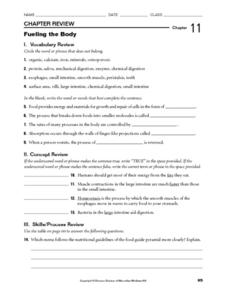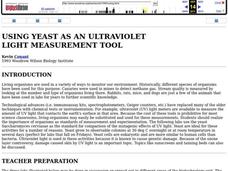Curated OER
USING YEAST AS AN ULTRAVIOLET LIGHT MEASUREMENT TOOL
Pupils realize the importance of organisms as standards of measurement and experimentation.The first lab is a simple survival curve that demonstrates the effects of UV light on cells. The second lab looks at repair mechanisms of the DNA...
Curated OER
Effects of Acid Rain
Third graders explore the concept of acid rain and its effects on ecosystems. They are placed in groups and using a graphic organizer they brainstorm their ideas about what would happen to the ecosystems living within these environments...
Curated OER
Earth's Atmosphere and Temperature
Students explore the layers of earth's atmosphere and conduct an experiment to identify carbon dioxide. They construct models using styrofoam to represent molecules in the atmosphere's layers. To discover how sunlight efffects...
Curated OER
COMPARISON OF FOUR-, SIX-, AND EIGHT-bp CUTS IN CALF THYMUS DNA
Students use this laboratory exercise, restriction enzymes to recognize a four-, six-, and eight-nucleotide sequence. Assuming that the four component nucleotides (A, C, T, G) are distributed randomly within a DNA molecule, then any...
Curated OER
Alkanes: Physical Properties
In this alkanes worksheet, learners complete a graphic organizer by filling in the number of carbon atoms for the given alkanes. Students plot a graph showing how physical properties change with the number of carbon atoms. Then learners...
Curated OER
Fueling the Body
In this nutrition worksheet, students review the organs and enzymes that are part of the digestive system. Then students review the food pyramid by comparing two menus. This worksheet has 9 fill in the blank, 4 true or false, and 5 short...
Curated OER
Homeostasis
Learners explore homeostasis and identify it in work in an organism. They brainstorm things that stay the same and participate in several demonstrations that illustrate homeostasis. Students predict baseline breathing and jumping jacks
Curated OER
Displacement Reactions and Acid/Base Reactions
In this chemical reactions instructional activity, students review the solubility rules for common salts. Students determine the molecular equation, ionic equation, and net ionic equation for specific reactions. Students calculate moles...
Curated OER
Clues to Copying the Code
In this DNA worksheet, students access a website to determine the information that was used to understand DNA replication. Students compare the difference between observations and opinions. This worksheet has 7 short answer questions and...
Curated OER
Lewis Structures and Bonding
In this compounds learning exercise, students complete a graphic organizer by filling in the chemical compounds structure, resonance, geometry, hybridization, and bond angles. Then students complete 2 short answer questions.
Curated OER
Passive and Active Transport
In this transport learning exercise, students compare and contrast the characteristics and examples of active transport and passive transport. This learning exercise has 1 graphic organizer and 11 short answer questions.
Curated OER
Acid, Base, or Salt?
In this acids and bases worksheet, students read about the differences between acids and bases and then complete a table comparing the characteristics of both. Then students determine if the given statements describe an acid, base, or...
Curated OER
What is a Sound?
Second graders explore the concept of sound. For this sound lesson, 2nd graders discover what sound, vibrations, and pitch are through several experiments. Students watch a Power Point presentation that allows them to complete a graphic...
Howard Hughes Medical Institute
The p53 Gene and Cancer
Is understanding the p53 gene the key to kicking cancer? Introduce a most-important protein through a presentation with colorful diagrams, simulations, and brief lectures. Viewers discover how p53 works, the cellular processes it...
Curated OER
Digestive System Quiz
In this digestive system activity, students answer 9 questions, 2 of which are multiple choice and 7 are short answer. Included are questions about the process of digestion and the structures of the digestive system.
Curated OER
How to Design an Experiment
Students work together to develop and implement an experiment. They investigate the properties of nylon and construct a mobile of organic materials. They share their experiments with the class.
Curated OER
Homologous Shoes
Students examine the concept of homology by observing their shoes and those of their classmates. They summarize the observations of everyone's shoes relating it to chromosomes in cells. They share their observations with the class.
Curated OER
Using Ion Exchange Chromatography to Separate Proteins
Students explore protein purification by separating a positively charged molecule, lysozyme, from a negatively charged molecule, albumin, at neutral pH using ion exchange chromatography.
Curated OER
Science: Designer genes
Students engineer new organisms using biotechnology. In small groups, they write procedures, list benefits and drawbacks, and explain how their new organism might affect the environment. After creating their new organisms, they present...
Curated OER
Using Yeast as an Ultraviolet Light Measurement Tool
Students accurately measure the relationship between radiation dose and either survival or some genetic event such as mutation or recombination. They investigate the damage that was done to the DNA molecule as a result of exposure to...
Curated OER
Which Wrap Is Wrapped Right?
Young scholars investigate the integrity and strength of different types of food wraps. They test the wraps and create a graphic organizer for the data. Once it is organized then a lab report can be written. The lesson plan contains...
Curated OER
The Code of Life
Students study genes, DNA and medical research. They watch "The Code of Life" video and answer discussion questions regarding the transcription and translation of DNA and how errors in these processes and mutations in DNA can produce...
Curated OER
The Chemistry of Killer Coal
Students research chemical components of coal, as well as environmental health impacts of mining and burning coal. They discuss conservation of mass as it relates to combustion of organic compounds.
Nuffield Foundation
Digestion of Starch: Microbes
Sugar isn't good for you, but it's great for microbes. A simple experiment has pupils investigate the digestion of starch by microbes to produce sugars. They apply two bacterial cultures, an amylase solution, and distilled water on a...
Other popular searches
- Organic Molecules Proteins
- Organic Molecules of Life
- Organic Molecules Lab
- Making Organic Molecules
- Gumdrop Organic Molecules
- 4 Major Organic Molecules
- Class of Organic Molecules
- Organic Molecules or Dna
- Testing Organic Molecules
- Chemistry Organic Molecules
- Chemistry, Organic Molecules

























